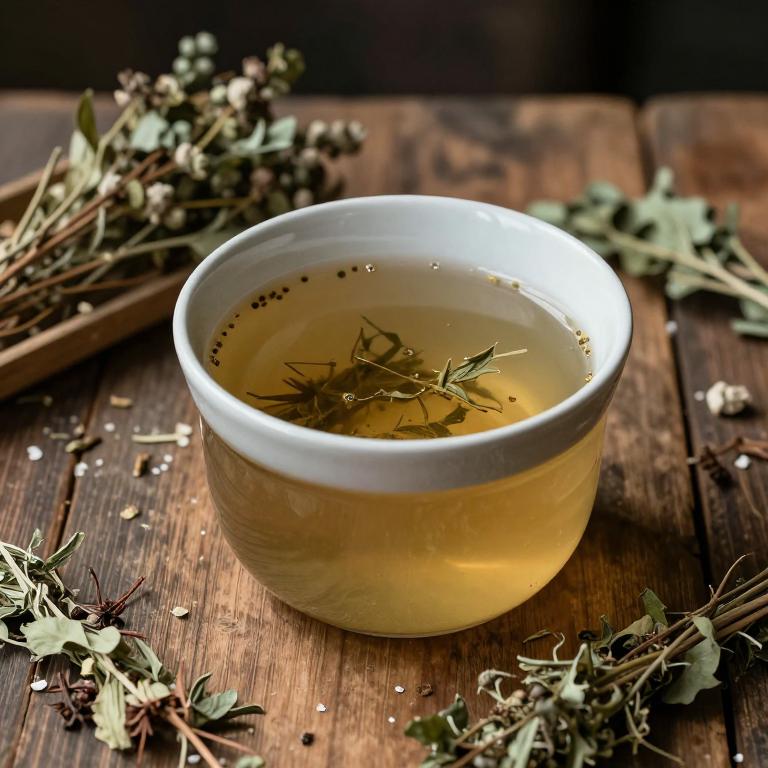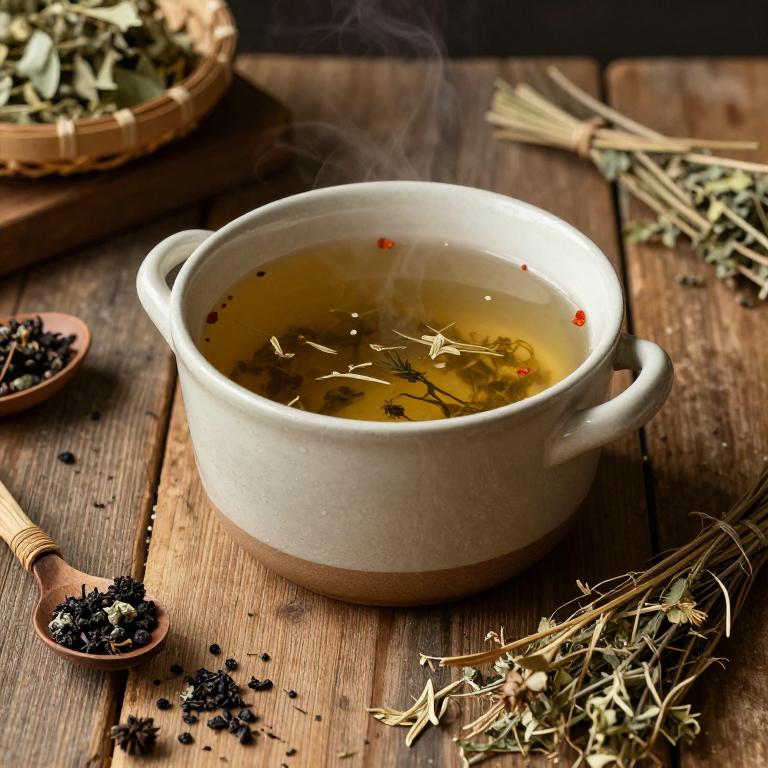10 Best Herbal Decoctions For Colds

Herbal decoctions have long been used as a natural remedy for colds, offering a gentler alternative to pharmaceutical treatments.
These decoctions typically involve boiling a mixture of herbs such as echinacea, ginger, thyme, and eucalyptus to extract their therapeutic properties. The steam and warmth from the decoction can help soothe sore throats and ease congestion, while the active compounds in the herbs may support the immune system. Many people prefer herbal decoctions for their calming effects and fewer side effects compared to over-the-counter medications.
However, it is important to consult with a healthcare professional before using herbal remedies, especially for those with underlying health conditions or taking other medications.
Table of Contents
- 1. Echinacea (Echinacea purpurea)
- 2. Ginger (Zingiber officinale)
- 3. Stinging nettle (Urtica dioica)
- 4. Thyme (Thymus vulgaris)
- 5. Camellia (Camellia sinensis)
- 6. Rosemary (Rosmarinus officinalis)
- 7. Peppermint (Mentha piperita)
- 8. Black elderberry (Sambucus nigra)
- 9. Salvia (Salvia officinalis)
- 10. Ceylon cinnamon (Cinnamomum verum)
1. Echinacea (Echinacea purpurea)

Echinacea purpurea, commonly known as purple coneflower, is a popular herbal remedy used to support the immune system and alleviate symptoms of colds.
Herbal decoctions of Echinacea purpurea are typically prepared by boiling the dried roots, leaves, and flowers in water to extract their active compounds. These decoctions are believed to have antimicrobial and anti-inflammatory properties that may help reduce the duration and severity of cold symptoms. Studies suggest that Echinacea may enhance immune response by stimulating the production of white blood cells.
However, while some research supports its efficacy, results are mixed, and it is often recommended as a complementary rather than primary treatment for colds.
2. Ginger (Zingiber officinale)

Zingiber officinale, commonly known as ginger, has been traditionally used in herbal medicine to alleviate symptoms of colds due to its warming and anti-inflammatory properties.
Ginger contains compounds like gingerol and shogaol, which have been shown to have antiviral and antioxidant effects that may help reduce the duration and severity of cold symptoms. When prepared as a herbal decoction, ginger can be consumed as a warm tea to soothe a sore throat, relieve nasal congestion, and promote sweating to reduce fever. This traditional remedy is often combined with other herbs like honey or lemon to enhance its therapeutic benefits.
While ginger is generally safe for most people, it is advisable to consult a healthcare professional before using it, especially for those with gastrointestinal issues or on medication.
3. Stinging nettle (Urtica dioica)

Urtica dioica, commonly known as stinging nettle, has been traditionally used in herbal medicine for its potential health benefits, including its use in treating colds.
Herbal decoctions made from the leaves and stems of Urtica dioica are believed to help alleviate symptoms such as congestion, sore throat, and fever associated with colds. The plant contains compounds like flavonoids and antioxidants that may support the immune system and reduce inflammation. To prepare the decoction, the dried leaves are boiled in water for several minutes, then strained and consumed as a tea.
While some studies suggest possible immune-boosting properties, more research is needed to fully confirm its efficacy for colds.
4. Thyme (Thymus vulgaris)

Thymus vulgaris, commonly known as thyme, has been traditionally used in herbal medicine for its potent antimicrobial and expectorant properties, making it a popular choice for treating colds and respiratory infections.
Thyme herbal decoctions are typically prepared by simmering the dried leaves and flowers in water to extract their active compounds, such as thymol and carvacrol, which have strong antiviral and antibacterial effects. These decoctions help to alleviate symptoms like congestion, coughing, and sore throat by reducing inflammation and loosening mucus in the respiratory tract. Many people find thyme decoctions to be a natural and effective remedy for mild to moderate cold symptoms, often combining it with other herbs like licorice or eucalyptus for enhanced relief.
However, it is important to consult a healthcare professional before using thyme decoctions, especially for individuals with allergies or those taking medications, to ensure safety and efficacy.
5. Camellia (Camellia sinensis)

Camellia sinensis, commonly known as the plant from which tea is derived, has been traditionally used in herbal decoctions to support the immune system and alleviate cold symptoms.
These decoctions typically involve boiling the leaves or stems of the plant to extract its bioactive compounds, such as polyphenols and caffeine. While not a cure for colds, these herbal preparations may help reduce fever, ease congestion, and provide a soothing effect due to their mild antiviral and anti-inflammatory properties. Some traditional remedies combine Camellia sinensis with other herbs like ginger or licorice to enhance its therapeutic benefits.
However, it is important to consult a healthcare professional before using these decoctions, especially for individuals with underlying health conditions or those taking medications.
6. Rosemary (Rosmarinus officinalis)

Rosmarinus officinalis, commonly known as rosemary, has been traditionally used in herbal decoctions to alleviate symptoms of colds due to its aromatic and antimicrobial properties.
When prepared as a decoction by simmering the leaves in water, rosemary can help soothe congestion and promote respiratory health. The essential oils in rosemary, such as camphor and cineole, possess decongestant and anti-inflammatory effects that may ease coughing and nasal blockage. Herbal decoctions made from rosemary are often combined with other herbs like thyme or eucalyptus to enhance their therapeutic benefits.
While rosemary decoctions are generally safe, they should be used with caution, especially in individuals with hypertension or those taking certain medications.
7. Peppermint (Mentha piperita)

Mentha piperita, commonly known as peppermint, is often used in herbal decoctions to alleviate symptoms of colds due to its soothing and decongestant properties.
When prepared as a herbal decoction, peppermint leaves are boiled in water to extract their essential oils and active compounds, such as menthol and menthone, which can help ease nasal congestion and reduce inflammation. This type of remedy is popular for its refreshing aroma and mild antispasmodic effects, making it a natural choice for relieving coughs and sore throats associated with colds. While peppermint decoctions are generally safe for most adults, they should be used with caution in children and individuals with certain medical conditions.
Overall, peppermint herbal decoctions offer a gentle and aromatic alternative to conventional cold remedies, supporting comfort and ease during illness.
8. Black elderberry (Sambucus nigra)

Sambucus nigra, commonly known as the European elderberry, is often used in herbal decoctions to help alleviate symptoms of colds and upper respiratory infections.
The berries, leaves, and flowers of the plant are typically harvested and dried before being used to make teas or syrups. These decoctions are believed to support the immune system due to their high content of antioxidants, flavonoids, and vitamins, particularly vitamin C. While some studies suggest that elderberry may reduce the duration and severity of cold symptoms, more research is needed to confirm its efficacy.
As with any herbal remedy, it is important to consult with a healthcare provider before use, especially for individuals with pre-existing conditions or those taking other medications.
9. Salvia (Salvia officinalis)

Salvia officinalis, commonly known as sage, has been traditionally used in herbal medicine for its potential benefits in treating colds.
Herbal decoctions made from sage leaves are often prepared by simmering the dried leaves in water to extract their medicinal properties. These decoctions are believed to help reduce symptoms such as sore throat, cough, and congestion due to their antimicrobial and anti-inflammatory compounds. Sage contains flavonoids and essential oils that may support immune function and soothe respiratory discomfort.
While anecdotal evidence suggests its effectiveness, it is advisable to consult a healthcare professional before using sage decoctions, especially for prolonged or severe cold symptoms.
10. Ceylon cinnamon (Cinnamomum verum)

Cinnamomum verum, also known as true cinnamon, has been traditionally used in herbal medicine for its warming properties and potential therapeutic benefits.
Herbal decoctions made from cinnamon bark are often employed to help alleviate symptoms of colds, such as congestion and sore throat, due to its antimicrobial and anti-inflammatory effects. The preparation involves simmering the dried bark in water to extract its essential oils and active compounds, which can then be consumed as a tea. Some studies suggest that cinnamon may support immune function and help reduce the duration of mild respiratory infections.
However, it is important to use cinnamon in moderation and consult with a healthcare provider, especially for individuals with allergies or chronic health conditions.